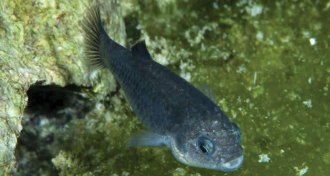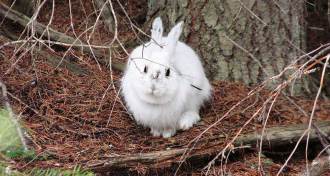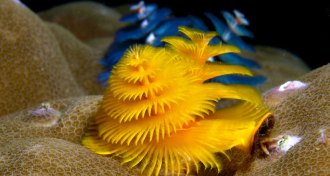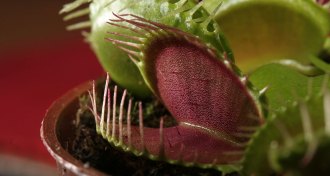Life
Sign up for our newsletter
We summarize the week's scientific breakthroughs every Thursday.
-
 Animals
AnimalsDevils Hole pupfish may not have been so isolated for so long
New genetic study questions Devils Hole pupfish’s supposed history of long isolation.
By Susan Milius -
 Animals
AnimalsClimate change may be deadly for snowshoe hares
The mismatch between coat color and the landscape can be deadly for a snowshoe hare.
-
 Paleontology
PaleontologyPlesiosaurs swam like penguins
Computer simulations of plesiosaur swimming motion may resolve long-standing debate on how the marine reptile got around.
-
 Animals
AnimalsChristmas tree worms have eyes that breathe, gills that see
Christmas tree worms and other fan worms have improvised some of the oddest eyes.
By Susan Milius -
 Health & Medicine
Health & MedicineMonkeys with human gene show signs of autism
Genetically altered monkeys may help scientists understand autism.
-
 Plants
PlantsTo catch a meal, a Venus flytrap counts to five
It takes two taps to trigger a Venus flytrap to close. Another three, a new study finds, are needed to turn on genes for producing enzymes.
-
 Animals
AnimalsTegu lizards warm up for mating season
The heat is on in tegu lizards during mating season, study suggests.
-
 Animals
AnimalsTegu lizards warm up for mating
Despite their cold-blooded reputation, tegu lizards boost their body heat while on the prowl for a mate, biologists report online January 22 in Science Advances.
-
 Agriculture
AgricultureJust adding pollinators could boost small-farm yields
Adding pollinators could start closing gap in yields for small farms.
By Susan Milius -
 Animals
AnimalsNew tree frog genus discovered in India
Researchers unveil a newly identified tree frog genus from northeastern India that eats mom’s eggs.
-
 Animals
AnimalsMeet the bugs that call your house home
A census of arthropods in human homes finds plenty of diversity — but few pests.
-
 Life
LifeMicroRNAs manage gut microbes
MicroRNAs mold gut microbes into healthier communities for the host.